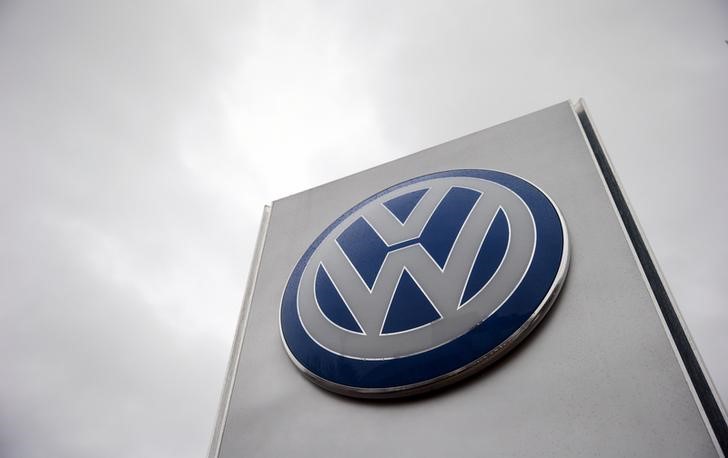By Andreas Cremer
BERLIN (Reuters) - Volkswagen (DE:VOWG_p) is set to announce its first cut in capital spending since the 2009 financial crisis, a sign of how the German carmaker's emissions-cheating scandal is weakening the position of its labour unions.
The supervisory board of Europe's largest car manufacturer will approve the cuts on Friday, sources familiar with the matter told Reuters, as the company prepares for the multi-billion euro bill to clean up its biggest ever business crisis.
Analysts on average expect Volkswagen (VW) to cut annual spending on factories, models and equipment by 10 percent from the 17.1 billion euros (12 billion pounds) announced last year. That figure was almost double the 8.6 billion average for 2010-12.
Labour unions have long wielded a greater influence at VW than at other German companies, dating back to the 1930s when the Nazi regime used expropriated union funds to build the massive plant at its home town of Wolfsburg.
But the company's admission in September that it cheated U.S. diesel emissions tests has triggered a crisis which is allowing the ruling Porsche-Piech clan to tighten its grip.
With a new chairman and CEO in place who are loyal to the family, some analysts think a power shift is underway that could weaken the position of unions and their local government allies who have often put investment and jobs ahead of profits.
"The way VW functioned in the past twenty years does no longer work," said Arndt Ellinghorst of banking advisory firm Evercore ISI, who has a 'buy' rating on VW shares on expectation the crisis could become a turning point for productivity.
"VW has its back to the wall and it will be management calling the shots ... not the works council," he added.
There were signs at the last supervisory board meeting on Nov. 9 that management is gaining the upper hand.
Works council chief Bernd Osterloh, who leads the nine labour representatives on the 20-strong board, launched into a criticism of VW brand chief Herbert Diess for cutting costs without consulting workers, sources close to the matter said.
But Osterloh, who can normally rely on the support of two board members from VW's home region of Lower Saxony, was forced to back down after a representative from Qatar, VW's No. 3 stakeholder, said his view was not shared by the majority.
The Qatari intervention was unusual because its two board members rarely speak at the meetings, the sources said.
Lower Saxony declined comment, while VW's works council and authorities in Qatar didn't return calls seeking comment.
A fund manager, who did not want to be identified because of the delicacy of the subject, said Osterloh would be better advised to cooperate with cutbacks.
"Diess' strategy is totally appropriate," he said. "If they (labour leaders) support the coming wave of cost reductions, they may be able to avoid even deeper cuts in future."
NO RED FLAGS
While VW has grown rapidly in recent years, briefly overtaking Toyota to become the world's biggest-selling carmaker in the first half of this year, the profitability of its core VW brand has lagged its major rivals.
The brand made a net profit of 540 euros per car last year, compared with 631 euros at Ford, 783 euros at General Motors (N:GM) and 1,647 euros at Toyota, according to the Center of Automotive Research.
Analysts have put this down in part to the strength of its unions, which have headed off retrenchments in the past.
When sales were tumbling in the early 1990s, for example, VW averted job cuts by introducing the four-day workweek.
During the 2008-9 financial crisis, the company also used a flood of profits from its expansion in China to avoid the cutbacks made in Europe by rivals such as Ford, Opel and PSA Peugeot Citroen.
One source close to VW's executive board said management had been forced in the past to seek "maverick technical solutions" to offset huge staff costs because cutting jobs was impossible.
The emissions scandal, however, is a greater threat than the company has faced before, with its preference shares down 35 percent since the crisis began and analysts saying the cost of fines, lawsuits and vehicle refits could top 40 billion euros.
VW has set aside 8.7 billion euros to help cope with its initial costs for falsifying both diesel and carbon dioxide emissions tests, and is seeking as much as 20 billion euros in funding from banks before the end of the year, sources said.
New CEO Matthias Mueller has said the company needs to overhaul its strategy and decentralise product planning as well as sales operations -- steps that will remove key decision-making from the IG Metall union's stronghold of Wolfsburg, where it represents more than 95 percent of VW workers.
New Chairman Hans Dieter Poetsch has also put workers on notice of cutbacks by saying the emissions scandal poses an existential threat to VW.
Other carmakers have invoked a state of emergency to wring concessions from unions. Peugeot, for example, closed a French plant last year, laid off thousands of staff and introduced a pay freeze as well as widespread outsourcing. The steps helped boost first-half profitability to 5 percent, almost double the VW brand's 2.7 percent.
VW unions will no doubt put up a fight, but Osterloh appeared to concede in a Nov. 13 interview with Deutsche Presse-Agentur that his negotiating position had weakened.

"In this situation we have other problems and no time to fight for our rights by waving red flags or calling a demonstration," he said.